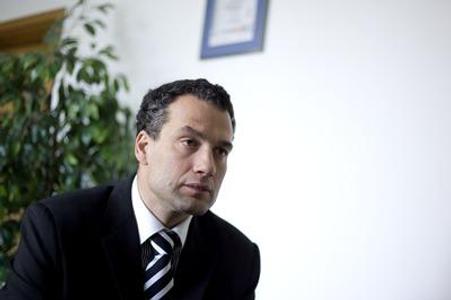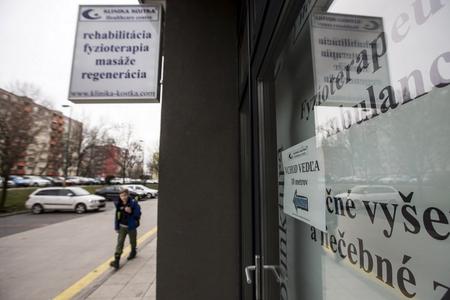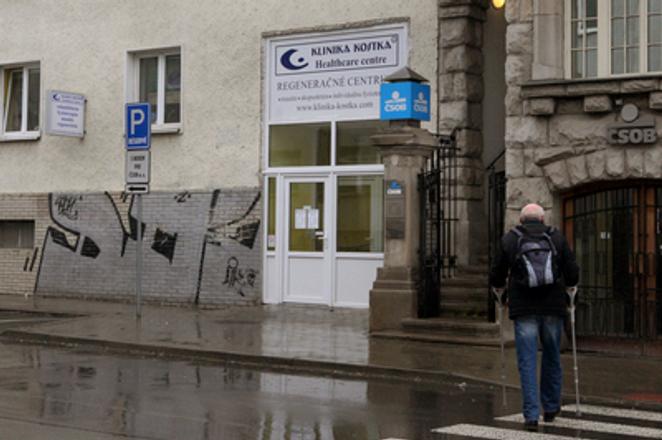Kostka started his career as a masseur and founded his first company CPKSB in 2008, which was not very successful. This, however, changed in 2012 when Smer won the elections and Marcel Forai was appointed head of Všeobecná Zdravotná Poisťovňa (VšZP). The revenues of the company increased from roughly €50,000 in 2010 to nearly €141,000 in 2012. They continued rising and in 2014 amounted to €1.5 million.
Kostka’s profits were also increasing, from nearly €8,700 in 2012 to €617,000 in 2014 and in Forai’s era Kostka expanded his network of health-care facilities going under the name Kostka Clinic to six, Sme reported.
Moreover, rehab doctors reproach their colleague Kostka for the low quality of treatments offered at his facility, by people who are not fully qualified to provide the services. Doctors filed a motion against Kostka in the beginning of February with the Health Care Surveillance Authority (UDZS).
“Slovaks don’t have illusions of their country but until this cause emerged I would never have thought that it is possible in Slovakia that someone is practicing charlatanism and is above-standard rewarded for that,” independent MP and deputy chair of Sieť party Miroslav Beblavý, who published the information in the beginning of February, told the Denník N daily. “Thanks to his connections Kostka received multiple times more money than he would if he did that in the right way.”

Kostka has meanwhile refuted the claims saying that his clinics receive more money due to the increase of patients. Also VšZP spokesperson Petra Balážová told Sme that the money they give to the clinic is a result of the clinic spreading to more locations.
“If Mr Beblavý continues to launch these senseless and untrue attacks, the clinic will move to protect its reputation in court,” reads Kostka’s statement, as quoted by the TASR newswire. “Klinika Kostka is requesting that the said MP stop libelling the clinic as part of its campaign.”
The National Criminal Agency (NAKA) has, of its own initiative, responded to suspicions by analysing all contracts concluded by VšZP, including those with Klinika Kostka.
Becoming rich
CPKSB signed agreements with VšZP for more than €3 million per year. This is 21 times higher than in was before 2012, according to Beblavý.
While VšZP has twice the number of clients as the other two private health insurers, Dôvera and Union, the insurer pays in the millions for CPKSB's services, up to ten times the amount as the other two insurers, according to Denník N.
One of the reasons why Kostka’s firm has such high income from the public insurer is that it receives money for a special treatment known as “targeted long-term therapy”. CPKSB gets €45 for one such treatment which takes around three hours, the daily wrote.

Beblavý, however, pointed out that the therapy consists of normal standard medical services such as massages and rehabilitation which would be up to five times cheaper if they were done individually. He added that he sent a person from his team to try the treatment and discovered that the promised 3-hour-long service took only 90 minutes and no doctor was present, despite it being a preliminary check of the patient.
Pilot project
When journalists asked Prime Minister Fico about the price for the treatment he stated that it was introduced by Marian Faktor of Christian Democratic Party (KDH) in 2011 who was managing the VšZP during Radičová’s previous government and the current government cancelled it.
However, when Faktor managed the VšZP the treatment was just a temporary pilot project to see whether it would decrease patients' medication use thanks to rehabilitation. That is the reason why only Kostka was able to receive money for such service from VšZP. If treatment proved itself successful, other providers would also be able to ask for money covering such services, according to Faktor.
When Forai took the helm of the insurer the price for the treatment increased from €30 to €45.
VšZP stated that the price hike was appropriate and has not answered Denník N’s question as to why CPKSB’s is still the exclusive provider of the service.
Complaining doctors
After Kostka started to make headlines in Slovak media other doctors began complaining that his firm has significantly higher limits for patients than they do. Health insurer limit is a budget which the insurer has for the services of one doctor per month. If a doctor exceeds the budget, the insurance company will not pay for those additional services or it will give him only part of the full sum.
The Sme daily compared Kostka’s limits which he had in 2013 income from VšZP and Dôvera with the limits of a doctor from western Slovakia without specifying his name.
The limit set by VšZP for treating and healing activities of Kostka’s clinic in the town of Spišská Belá was €20,460 in September 2013, while at his other clinic in Nitra it was €30,000 in the same month. Yet Dôvera set a limit of €3,500 for each clinic.
To compare, the doctor interviewed by Sme had a limit of €4,400 for rehabilitations which are part of treating and healing activities and another €700 for checking people in discipline of physical medicine and rehabilitation.
Magdaléna Perichtová who runs a medical facility in the town of Dubnica nad Váhom also complains about prices.
“We are doing that for 5€ and he is doing that for €45,” Perichtová told the Sme, adding that the €45 sum is not exaggerated but the problem is that only Kostka gets it.
VšZP responded that it covers rehabilitation services of Kostka clinic in the same way and with the same sum as it does in case of other physical medicine and rehabilitation facilities.
Moreover doctors filed a complaint for allegations that one of the Kostka Clinics lacked a rehabilitation doctor, treatments were carried out by uneducated employees, not professionals and Kostka calls its facilities “clinics” despite that they are not clinics and thus he was misleading his patients, according to Perichtová who told Sme about the complaint.
Unnecessary demands
The UDZS asks rehab doctors who criticize their colleague Kostka to add voices of dissatisfied patients.
Former member of UDZS board Peter Ottinger, however, opines that a doctor filing a motion concerning wrongful proceeding of a colleague need not add the patient’s declaration.
“By this statement the UDZS confirmed its dependence on business-politician connections,” Ottinger said, as quoted by Sme. “Thus it looses its independence and belongs among useless institutions.”
UDZS claims it is only collecting necessary data and information to open the case.
Nevertheless, the independence of the office could be questioned because its head Monika Pažinková has close ties to the now ruling Smer, Sme wrote. She was appointed to the office by Smer's government and her husband Peter received donations for his polyclinics in Prešov from Richard Raši who was health care minister during the first Fico government. After donations were given, bankrupting polyclinics turned into successfull business, according to Sme.
Prime Minister supports massages
Additionally, Fico allocated €20,000 from his reserve to a Thomas Alva Edison Research Foundation which belongs to Slávka Kostková who is in several firms with Kostka. The foundation was created in February 2014, according to Transparency International Slovakia (TIS) watchdog.
“However, Kostkas became bored with non-profit activities soon,” TIS’s head Gabriel Šípoš wrote in TIS blog. “Only a month and half after they signed the contract with the prime minister the non-profit organisation wrapped up [its activities] and is in liquidation since July 2015.”
During a February 3 press conference Fico responded that he has supported many health-care facilities from his reserves and if it is proven that his donation is misused it must be returned.
Who wrote the letter?
The support of a short-lived foundation possibly is not the only thing connecting Fico with Kostka. Private broadcaster TV Markíza found out that author of Kostka’s first e-mail statement commenting on the allegation presented by Beblavý is Mária Trošková. The person with the same name is Fico’s controversial assistant who posed for an erotic magazine in the past.
“It means that she is the author of the primary document that could be consequently edited by anybody,” Pavol Lupták from the IT firm Nethemba told Sme.
A month ago pictures of Fico and Trošková appeared on social networks showing them getting into a dark van, in which bodyguards drove them to the Bratislava Hotel DoubleTree by Hilton. It belongs to a firm close to one of the Váhostav owners Juraj Široký, who is believed to be a sponsor of Fico’s Smer, according to Sme.
“I am not an IT expert,” Fico argued at a press conference, as quoted by Sme. “My office receives hundreds of e-mails per day. The office also received an e-mail from Kostka Clinic which is the same as Kostka Clinic sent to all media. And no one wrote any statement for Kostka Clinic.”



 Kostka Clinic in Banská Bystrica (source: Sme)
Kostka Clinic in Banská Bystrica (source: Sme)